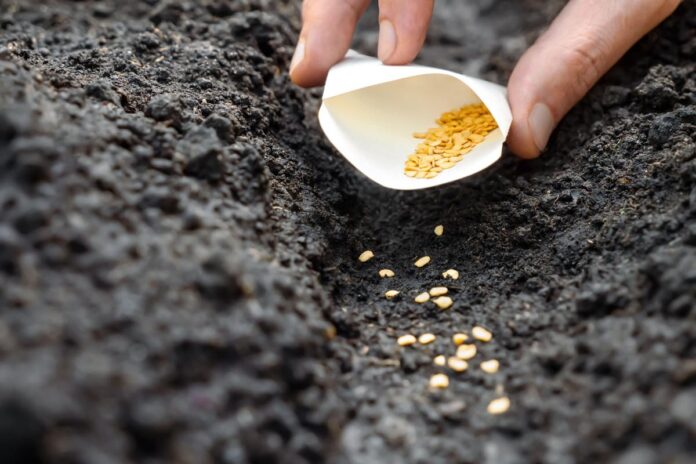If you think you only sow vegetable seeds in spring, think again. You can still be sowing cabbage, carrots, kale and spring onions in August, as well as radishes, turnips, spinach and pak choi. And don’t worry too much about the changeable weather this summer, says Sean Lade, director of Easy Garden Irrigation, who maintains that as long as you’re not sowing seeds in waterlogged ground, you should be OK. Seed-sowing won’t be affected if the water has leeched some of the nutrients out of the soil, but hopefully you will have added plenty of organic matter to the planting area beforehand. ‘It can take a few days after heavy rainfall for the soil to be dry enough to plant in,’ says Holly Jones, gardening expert at garden product supplier Garden Street. ‘To know whether your soil is still too wet to sow seeds into, simply remove the first two to three inches of topsoil and grab a fist full. If the soil sticks together in your hand, it’s still too wet, so wait another couple of days for it to dry out a little bit more. ‘It’s fine to plant new seeds in damp soil. Just be careful not to overwater them later down the line.’ Among the best crops to sow in August are leafy greens like kale, Chinese cabbage, pak choi, cabbage, spinach and lettuce, she says. Use good quality, well-rotted compost or manure and prepare the soil well by removing any dead crops and weeds. Finally, ensure you’re only planting what you have room to grow to avoid overcrowding the veg, as this can stunt the crop’s growth and lessen your yield. Here are five vegetables to sow or plant in mid to late August… 1. Turnips Turnips are a reliable and versatile root vegetable that can be sown at this time of year, as the cooler temperatures in late summer and early autumn are perfect for their development. Sow them directly into the soil in drills one-and-a-half centimetres deep and around 20 centimetres apart. The soil should be well-drained, and it’s ideal to add some well-rotted manure or organic matter before sowing. Top tip: Water regularly to keep the soil moist, but avoid waterlogging. Turnips should be harvested when they are no larger than a tennis ball to ensure they maintain their tenderness and sweet flavour. 2. Spinach Late summer is the perfect time to sow spinach for a tasty autumn harvest. Sow seeds directly into the ground in rows about 30 centimetres apart, and cover lightly with soil. Spinach prefers a rich, moist soil with a good level of nitrogen, so consider adding some organic compost to the soil before planting. Top tip: Keep the soil moist, but be mindful not to overwater, as this can cause the leaves to become tough. When leaves are a suitable size, cut them individually rather than harvesting the whole plant to encourage new growth and a continuous supply. 3. Pak choi Pak choi is ideal for an autumn to early winter harvest when sown in mid to late August. It requires well-drained, fertile soil and cooler temperatures. Seeds can be sown directly into well-drained, fertile soil at a depth of one centimetre, with rows about 30 centimetres apart. Regular watering and successful planting will ensure a continuous crop. It’s crucial to keep the area weed-free and watch out for slugs and snails which may damage the leaves. Top tip : To keep a continuous supply of pak choi, consider successional planting, sowing new seeds every few weeks. 4. Rocket ‘Salad rocket and mustards are really good to sow now, although the first little leaves are the most vulnerable to the flea beetle. But the weather isn’t affecting much,’ says garden expert, writer and YouTuber Charles Dowding, pioneer of the ‘No Dig’ philosophy who’ll be hosting an open day his farm in Somerset on September 3. ‘My timings are the same. If you can sow under cover and then get seedlings out, even if they’re only two weeks old, August is a great month. We’ve got the warmth and moisture, which means things are growing well.’ Top tip: If the weather changes and we get a hot spell, give the rocket some shade to help prevent it from bolting quickly. 5. Radish You can still sow this fast-maturing crop which adds a peppery zing to salads in August, in fertile, moisture-retentive soil. They’re ideal for filling gaps where other crops such as beetroot or lettuce have been harvested. Top tip: Harvest them when they’re small, just about two centimetres across. If you let them get much larger, they will become tough and woody.
27 August, Tuesday, 2024


